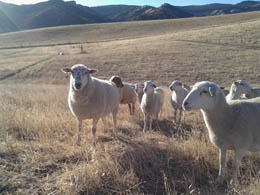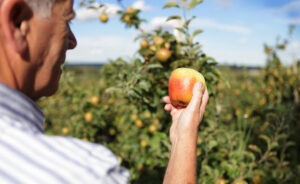[ad_1]
Every winter, FruitGuys Senior Buyer and Chief Fruit Detective Rebecca North counts down the days to the EcoFarm Conference. The event hosted by the non-profit Ecological Farming Association brings together farmers, educators, scientists, and more for four days of workshops, farm tours, and presentations. This year, EcoFarm 2024 popped up in Pacific Grove, CA, and ran from Jan. 16–20.

 “More than 1,200 people showed up for the 44th-annual conference. There were 73 workshops in English and Spanish, 210 speakers, and attendees from 23 states and 7 countries,” said Rebecca, who serves as the Ecological Farming Association’s interim executive director.
“More than 1,200 people showed up for the 44th-annual conference. There were 73 workshops in English and Spanish, 210 speakers, and attendees from 23 states and 7 countries,” said Rebecca, who serves as the Ecological Farming Association’s interim executive director.
EcoFarm 2024 Highlights
EcoFarm 2024 featured multiple keynote speeches from farmers like Maria Ana Reyes of Narci Organic Farms, Doria Robinson of Urban Tilth, Nicole Masters of Integrity Soils, and David Mas Masumoto of Masumoto Family Farm. Hot workshop topics included soil biodiversity, organic vs. regenerative farming, growing flowers, integrating livestock, and farming natural fibers like cotton, wool, and hemp.


EcoFarm attendees did more than sit and listen, though. They visited local farms on a bus tour and sipped their way through wine, cider, beer, and kombucha tastings. They also forged connections at an Intergenerational Farmer & Rancher Mixer and gathered to swap seeds, scions, flowers, and tubers. That list only scratches the surface of the conference’s offerings.
Rebecca’s favorite workshops and events were the ones that amplified the voices of Black, Indigenous, and people of color (BIPOC) farmers, like “Indigenous Perspectives on Soil, Food Systems, and Resiliency” and the “Black Led Black Fed Ecosystems Opening Meet Up.” The former featured a moderator and speakers with Kiowa, Cochiti, Cherokee, Mutsun, and Navajo heritage while the latter brought Black farmers and land stewards together.
Celebrating Queer Farmers


Rebecca also stepped up to lead a workshop herself.
“I organized and moderated a session on ‘Celebrating Successful Queer Farmers and Food Activists,’ where we discussed resilience, adaptability, strategies for creating safe and inclusive spaces, and tools to achieve economic, energetic, and personal sovereignty,” she said. “This topic is important to me because I have been a queer woman in the produce industry and good food movement for over 20 years. The adage ‘we cannot be what we cannot see’ rings true; I believe openness, encouragement, mentorship, conversation, and celebration are keys to empowerment.”
In 2021, EcoFarm honored Rebecca with its Golden Pliers Award for her work on the EcoFarm Planning Committee and for founding its Diversity Advisory Group. She said that this year, she was thrilled to see so many new faces in the conference crowd.
“I love the ideas, energy, and passion the youth bring. Next year I’d like to see sessions on urban farming, mental health resources for growers, and land access successes and challenges,” she said.
Lessons for the Future
One of the biggest lessons Rebecca took away from EcoFarm 2024 came from David Mas Masumoto‘s keynote talk about the importance of storytelling.
“Mas, a third-generation Japanese-American grower, encouraged us to look deeply at our history, reclaim memories, stay curious, and share our stories,” she said.
Mas believes that “Life is a mystery to live, not a problem to be solved.” That idea resonated deeply with Rebecca because it reminded her that while farmers face countless challenges and unknowns, farming is about more than those obstacles. Farmwork creates stories and ways of life that are worth sharing, supporting, and celebrating.


Not only is Mas an inspiring speaker, but Rebecca said he also grows excellent fruit at Masumoto Family Farm.
“Mas’s Suncrest peaches — which FruitGuys has purchased from him each July for over a decade, and will continue to — are the best peaches I’ve ever eaten,” Rebecca said.
More About EcoFarm
EcoFarm aims to advance ecological and just farming and food systems through education, celebration, and advocacy. According to the event’s website, the conference is committed to doing three things:
- “Examining and changing our policies and practices to break down institutionalized white supremacy in our organizational practices, culture, and programs.”
- “Creating space and building capacity for learning and dialogue about racism and racial justice in agriculture and the food system among our community.”
- “Amplifying the voices of our black, indigenous, and people of color (POC) allies in the food system.”
Rebecca said it’s “this synergistic magic, roster of experts, and dedication to advancing equity in agriculture that make EcoFarm special.”
EcoFarm offers scholarships and the opportunity to volunteer/work trade to reduce the cost of attending the conference each year. The organizers also take workshop topic suggestions from the public. If you’d like to submit a suggested topic for 2025, keep an eye on the EcoFarm website. The submission link will go live soon.
[ad_2]




